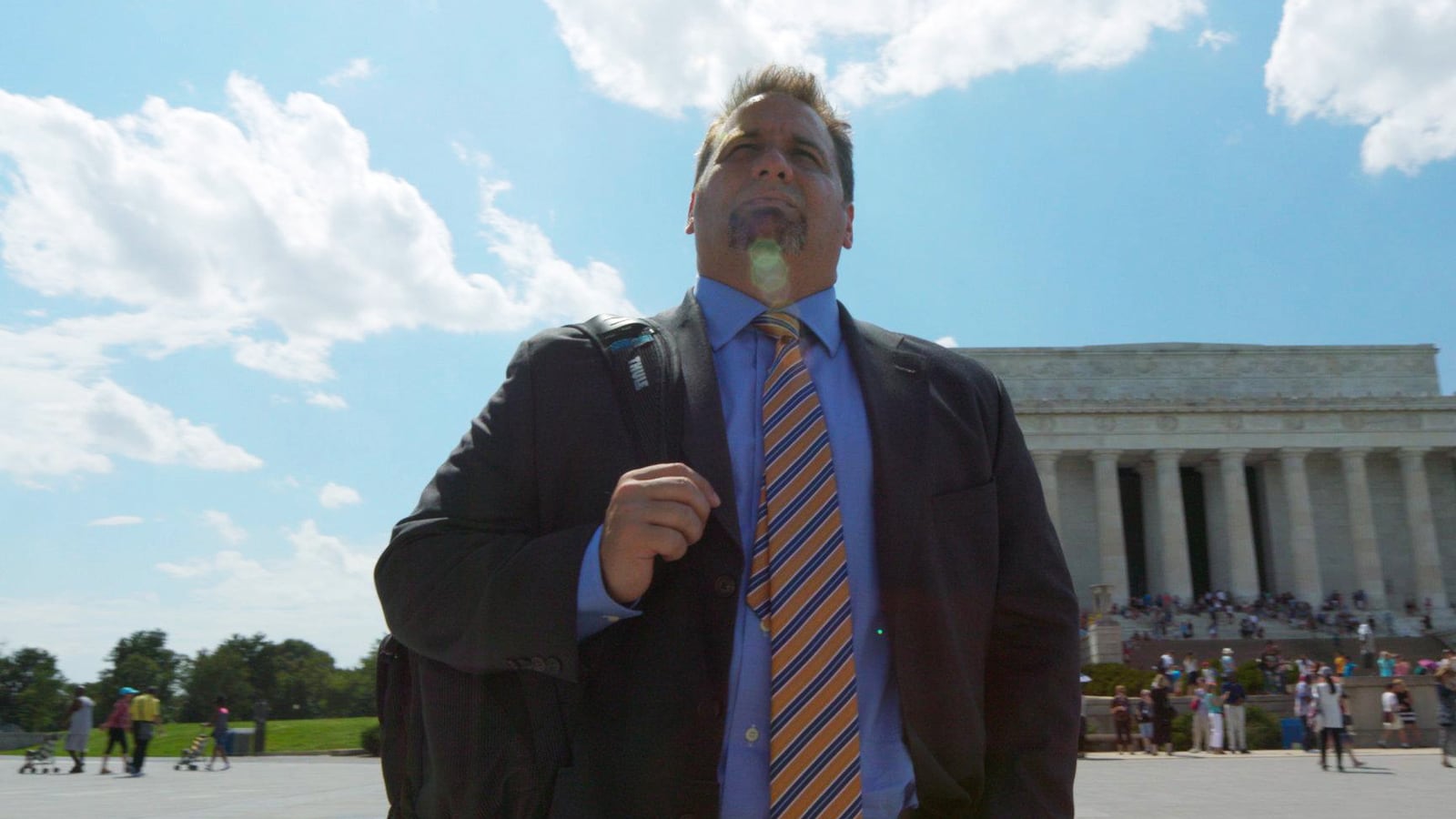Dan David ran a small Philadelphia-area investment firm that was hit hard by the 2008 economic downturn. Determined to get their clients’ money back, he and his partner began to buy into Chinese companies that were listed on American stock exchanges and were making tons of money for investors. By 2010, David’s company earned back the money it had lost.
But that same year, David started hearing that many of the companies he was investing in were basically shell corporations with no assets. Concerned about the validity of the reports, David hired a team to go to China and investigate 30 corporations. What he found, says David, is that the doom-and-gloom types “were understating the problem.”
David is the central character in The China Hustle, a new documentary debuting theatrically and on VOD March 30. The film is the story of a major financial scandal involving overvalued Chinese companies listed on the NYSE, NASDAQ, and the Over-The-Counter Bulletin Board that are promoted by banks and investment firms and have ripped off American investors to the tune of as much as $50 billion. This is money that, instead of going overseas to fraudulent Chinese businesses, could have been invested in legitimate corporations. And if the stock prices of these businesses collapse when their fraud is discovered, it is not the Chinese who lose money, but individual investors.
“When I first heard about this,” says China Hustle writer-director Jed Rothstein, “I thought this is totally nuts. We are still digging out of this old financial scandal, and no one is paying the price. The system is not set up to punish fraud, especially not internationally.”
The scam is relatively simple. In what’s known as a “reverse merger,” a Chinese company merges with an American shell company (a company which has largely ceased operation but is still listed on stock exchanges), and goes public without jumping through the regulatory hoops the SEC requires, because the American company has already gone down that road. Then, using inflated financial statements, the new corporation looks attractive to investment banks and other Wall Street entities, which hype the company and earn fees by selling its stock. According to the film, between 2006 and 2012, 400 Chinese companies were listed on U.S. exchanges, and 80 percent were the result of reverse mergers.
If it all looks good on paper and these companies seem legit, that’s because they have all been audited by well-known businesses like Price Waterhouse—but the financial statements are prepared by management, not the auditors, and, says Rothstein, “auditors are not set up to ferret out fraud. When you see an audit by a reputable company it doesn’t ensure there is no fraud, it just ensures the numbers provided to the auditors are added correctly.”
The perfect example of this con game is a company called Orient Paper, which claimed to be shipping tons of high-quality paper all over China, with revenues of $100 million annually. When a potential American investor went to check out the factory, he discovered it was on a poorly maintained country road that could not support the large trucks Orient was allegedly using to transport its product. Inside the factory, he discovered numerous broken machines, garbage rotting in the front yard, heaps of rotting cardboard everywhere. The American, Carson Block, called the business “a complete sham,” and wrote a report about his findings, which ultimately led to a collapse of Orient’s stock.
Outraged by this, and by a feeling that Americans were being ripped off because of the opacity in Chinese business dealings, David decided to sound the alarm. “First we went to exchanges and investment banks,” he says. “They basically said get out of here, you’re basically telling us not to collect fees. Then we went to the SEC. They have no mandate, no jurisdiction in China, so what are they supposed to do? They can’t investigate, and they can’t send someone to China.”
“The finance industry is set up to maximize opportunity and, in international cases, to minimize accountability,” adds Rothstein. “Because of this lack of accountability it enables the bad actors in China to get away with fraud in the U.S. market, and it enables the gatekeepers [the SEC, auditors, etc.] to have plausible deniability. There isn’t a lot of appetite for regulation and rules.”
So what else is new? Fraud seems to be baked into the system, and has been for quite some time. The China Hustle makes it clear that it is not illegal in China to steal from foreign investors, that if a Chinese company releases false information about its financials into the U.S. market, Chinese authorities have no power to punish it. Couple this with the anti-regulatory mindset of the American government and its investment community, and you have the perfect recipe for massive deceit.
“The industry should encourage laws that foster accountability and transparency and they don’t,” says Rothstein. “And there are people of good faith in our government trying to do the right thing, but now, with this current administration, they want to remove regulation, and make more of a free for all. Free for all is fine if you have a level playing field, but our government is not doing its job to ensure fair play in the markets.”
Adds David: “We have decided as a government that fraud is a fine that companies pay. What the banks say to the government is, you catch us committing fraud, put a number on it, and no one goes to jail.” And the government acquiesces because, adds David, “anyone of these banks makes more profit in one quarter than the SEC has in its entire budget.”
David has decided to fight back by outing companies in reports he publishes, then making money off their stock downturns by the process known as short selling—borrowing stock at one price, selling it, then buying it back once bad news causes the price to collapse and he can return the borrowed shares to the owner at a profit. He and other like-minded investment experts have put dozens of companies out of business in this way, but it’s only a drop in the bucket.
“When I went to Washington” to alert the SEC and others about these frauds “no one wanted to hear me,” he says. “But now when I say something is a fraud [they listen].”
The China Hustle ends with footage of the 2014 initial public stock offering by Chinese commerce giant Alibaba, the biggest IPO in history.
But was the company really worth the initial $25 billion dollars it managed to raise? Or was buying its stock akin to “buying a lottery ticket,” as one skeptic says in the film? The China Hustle does not answer these questions, but certainly leaves doubt in the viewer’s mind.
Ultimately, David says he is not angry with China, but with the American investors and institutions that enable these deceptive practices. “You don’t know how many threats I get,” he says, “and it’s not from some Chinese CEO. It’s from a guy who lost money in his E-Trade account. It taught me that people in this country would rather make money on a fraud than lose money on the truth.”






